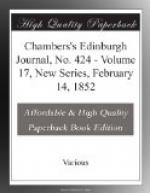My grandfather, William Wilson, was born in the farmhouse of Drumbrae, on the estate of Airthrey, at no great distance from the field of Sherrifmuir. At the rebellion of 1715, he was a lad of fifteen years of age, and learning that the rebels under the Earl of Mar had met with the royal forces under the Duke of Argyle in the neighbourhood, on the morning of Sunday the 12th November, while it was still dusk, he went to the top of a neighbouring hill named Glentye, from which the whole of the moor was discernible, and on which a number of country people were stationed, attracted to the spot, like himself, by curiosity. Being at no great distance from both armies, he could see them distinctly. The Highlanders, who observed no regular order, he compared to a large, dark, formless cloud, forming a striking contrast to the regular lines and disciplined appearance of the royal army. After observing them for some space of time, an orderly dragoon, sent by the Duke of Argyle, rode up to the spot where the spectators stood, warning them to remove from a position in which they were in as great danger as the combatants themselves. My grandfather accordingly returned home, listening with awe to the sharp report of musketry, intermixed with the booming of cannon, which now informed him that the battle had commenced. He had not been long in the house when a dismounted dragoon made his appearance, requesting to have his left wrist bandaged, so as to stop the blood. The hand had been cut off, and his horse killed under him, and he was on his way to Stirling to seek surgical aid. While his wishes were being complied with, he occupied himself in taking some refreshment, till one of the farm-servants came in and warned him that four armed Highlanders were coming down the hill in the direction of the house. The soldier, who had no doubt been taught at the Marlborough school, and served perhaps at Ramillies and Blenheim, immediately went out to the front of the house, which concealed him from his enemies. Presently, he heard by the footsteps that one was near, when he instantly presented himself at the gable, and shot the foremost Highlander with his carbine; then, seeing that the others came on in Indian file, with short distances between, he advanced to meet them, dropped the second with a bullet from his pistol, and cut down the third with his sword. The fourth, seeing the fate of his comrades, took to flight. After this wholesale execution, the dragoon, with perfect coolness, returned to the house, finished his repast, tranquilly said his thanks and adieus, and went off in the direction of Stirling. The next morning the country people were summoned to bury the dead. The ground was thickly covered with cranreuch, and life still remained in numbers of both armies, who begged earnestly for water. But what struck my grandfather particularly was, that the heads and bodies of a great many of the slain royalists were horribly mutilated by the claymores of the Highlanders; while on those of the Highlanders themselves nothing was observed but the wound which had caused their death.—Communicated by Mr Alexander Wilson, shoemaker, Stirling.




